Plants ordered now will ship Spring 2026 🙂
Tulsi, Temperate — Holy Basil (Ocimum africanum) potted plant, organic
Family: Mint (Lamiaceae)
Annual, harvest at 40 days and ongoing to frost
(Temperate Tulsi) The plant is a bushy annual tea basil with small leaves, purple flowers and a tutti-frutti fragrance. Among all basils in my experience, this one is (surprisingly) the shortest season, most frost-hardy cultivar. I’ve also seen these self-seed the following year, which is unusual among basils. We tested this cultivar and confirmed the presence of essential oils linalool, nerol, geraniol, citral, icocaryophyllene, humulene, etc. Also ran it for genetic analysis to confirm identity as Ocimum africanum. This is the holy basil my wife and I grow for ourselves to make into tea. We find it very satisfying, with aroma most appealing. Traditional usage (Ayurveda): stress, anxiety, heart disease, arthritis, diabetes, and dementia. Drinking tulsi tea in the morning is a fantastic way to get started.
Potted plant Certified Organically Grown

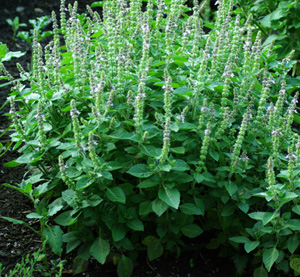
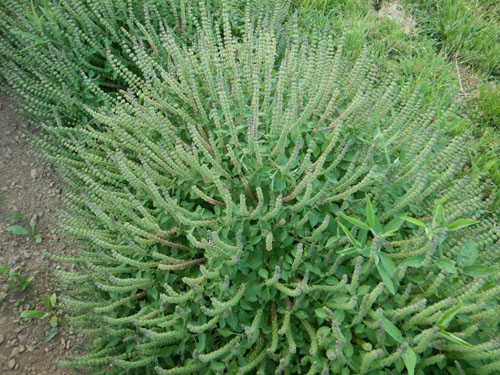
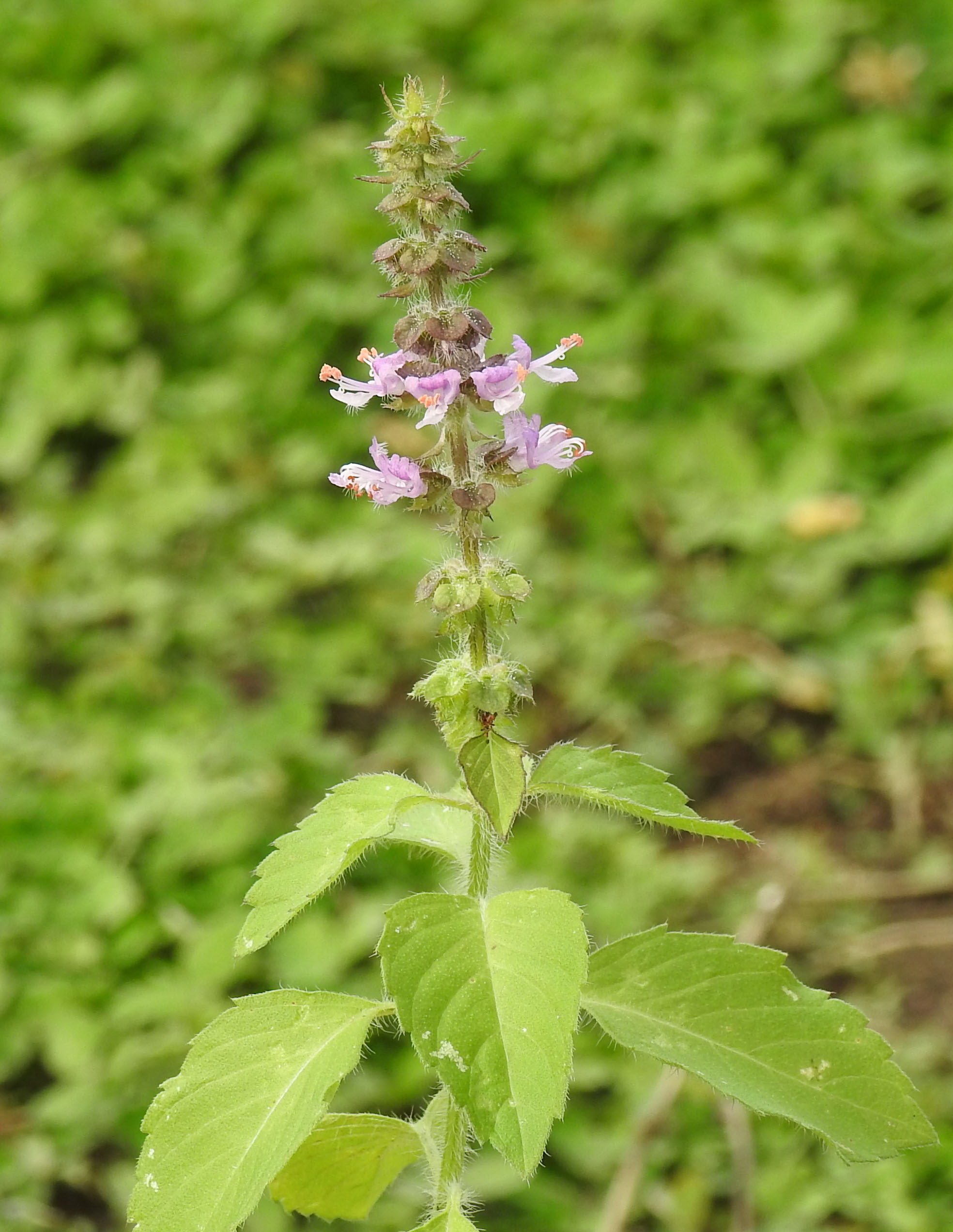
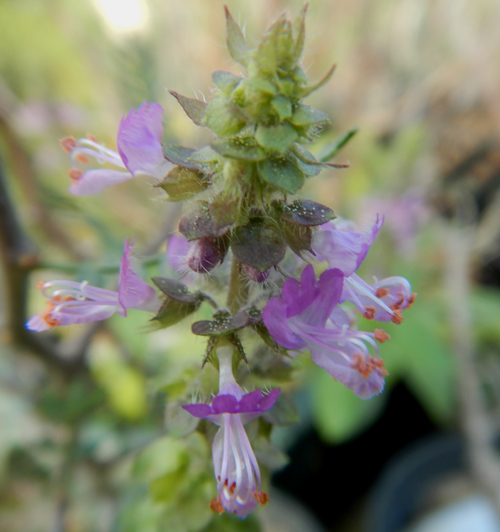
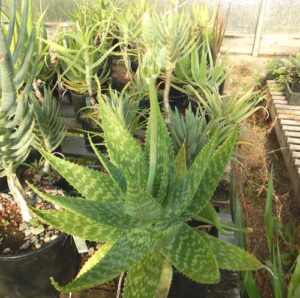
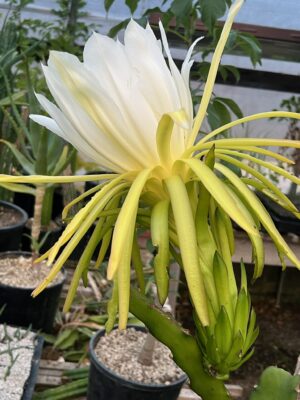
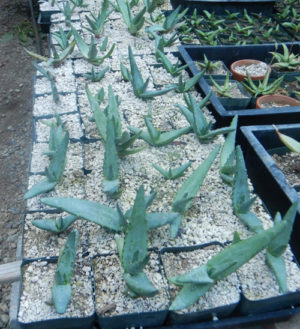
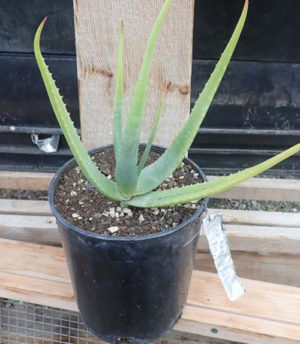
Ashely (verified owner) –
I am so happy with this little plant! We live in MN and it really took off once it got warmer this past July. We make tea from it just about daily. I’m wondering if anyone has made a tincture from it?
Upvote if this was helpful (0) Downvote if this was not helpful (0) Watch Unwatch Flag for removal
Richo Cech –
hi ashely, yes, it makes a great tincture. formulas on page 280 to 281 of
“Making Plant Medicine.” richo
Upvote if this was helpful (0) Downvote if this was not helpful (0) Flag for removal
Question
Jesse Hoteling –
Do you happen to know how/why this particular plant/cultivar/species got confused with “true” Tulsi (Ocimum sanctum/tenuiflorum)? I’m glad someone finally took the time to properly identify it, thank you! Hopefully other seed dealers and botanical gardens will figure it out. I certainly haven’t traveled all of India, but of all of the Tulsi I have seen so far, none are this plant/cultivar/species. It seems only in the USA and maybe Europe, this is what is sold as “Tulsi”.
Upvote if this was helpful (1) Downvote if this was not helpful (0) Watch Unwatch Flag for removal
Richo Cech –
Hi Jesse, Thank you for acknowledging us in this regard, it has been EXTREMELY hard to debunk the trend in misidentifying Ocimum africanum as Ocimum tenuiflorum. Many have used the very lovely but antique adage “Ocimum sanctum” as a bridge, but that doesn’t really help. at all. In fact, that was the beginning of the problem–misidentifying Ocimum africanum as “Ocimum sanctum.” It was innocent, well-meaning and. . . wrong. Yes, actually, we managed to turn around an industry on this one, a little like propping a pitchfork under a haystack to try to turn it over, but it was eventually successful. The majority of players have changed their label to “Ocimum africanum” although “Holy Basil” has stuck. In essence, all of it is holy. Temperate tulsi (Ocimum africanum) works well for people here in the states. Much easier to grow than true tulsi. But for those that want the real thing, it actually is growable, although slow. Right now, 8/11/2023, I wish everybody could see out 2 growouts of Ocimum tenuiflorum. They are epic. It would instill. . . faith. Richo
Upvote if this was helpful (1) Downvote if this was not helpful (0) Flag for removal
Question
Brittany Ainsworth –
Is it bad to let the plant flower?
Upvote if this was helpful (0) Downvote if this was not helpful (0) Watch Unwatch Flag for removal
Richo Cech –
Hi Brittany,
You can cut the flowers back at this time of year, dry them and use for tea. That will make the plant bush out and keep producing. Cut off no more than 1/3 if the plant. If you let it go to flower it will make seed. all good. richo
Upvote if this was helpful (0) Downvote if this was not helpful (0) Flag for removal
missindy83 (verified owner) –
How far apart do you recommend planting the potted plants? Thanks!
Upvote if this was helpful (0) Downvote if this was not helpful (0) Watch Unwatch Flag for removal
Richo Cech –
hi missindy, thanks for writing. we space these 1 to 2 feet apart, they do grow fairly wide but don’t mind shouldering in on eachother. richo
Upvote if this was helpful (0) Downvote if this was not helpful (0) Flag for removal
Melanie E Glover –
This tulsi is easy to grow from seed and grows well. I live in Colorado and have it on my back deck in the full sun in pretty harsh weather. It is strong and resilient. It self seeds and seems to come back stronger every year. It has a rich aroma and wonderful taste. I have found this tulsi variety to be very hardy, easy to grow, and gives a great harvest. Great product.
Upvote if this was helpful (2) Downvote if this was not helpful (0) Watch Unwatch Flag for removal
Scot Nyman –
Is this the Kappur (sp) cultivar?
Upvote if this was helpful (0) Downvote if this was not helpful (0) Watch Unwatch Flag for removal
Richo Cech –
no, actually Kapoor is a widely-used misnomer for this plant. If you stick to the Latin in this case, it is a bit more revealing of its truye origin–Ocimum africanum. Richo
Upvote if this was helpful (0) Downvote if this was not helpful (0) Flag for removal
Erica Reyes –
A thai speaking with an Italian accent! Oh richo! You make shopping for botanicals-an already joyous occasion for me!-all the more enjoyable! Anywayyy..Will the temperate and Rama be in stock this season?
Upvote if this was helpful (0) Downvote if this was not helpful (0) Watch Unwatch Flag for removal
Kristopher Schmidt –
Richo
Your hilarity is a charity to humanity.
…..though my question still lingers in the space between my ears.
What came of that African Tea Basil from 2008/9ish?
Was it reNamed or freed from the herd?
And oh yeah, will these basil’s ever cross-pollinate?
Kristopher
Upvote if this was helpful (1) Downvote if this was not helpful (0) Watch Unwatch Flag for removal
Richo Cech –
Hi Kristopher,
Thanks for upping my day! Basils of the same species will hybridize and you have to watch out for that. Don’t grow Thai next to Genovese, you’ll get Thainovese, which is like a Thai speaking with an Italian accent. There are many different African Tea Basils–in Swahili these are known as Kivumbasi, being the tropical annual wild version. We still propagate “Kivumbasi Lime” which was the nicest we ever found, so that’s why we’ve let other accessions go and just kept what seems to work well for us. Richo
Upvote if this was helpful (1) Downvote if this was not helpful (0) Flag for removal
Kristopher Schmidt –
Ricco
Is this the variety that you had labeled/sold as “African Tea Basil” about a decade ago. I remember getting them along with the Kivumbasi Lime and Mtule varieties……
I thought I had a plant of them, started the seeds and now it seems like ye ole Vana Tulsi from around the same time….
Basil confusion, aroma delusion, do you have a solution?
(Old friend) Kristopher in Medford
Upvote if this was helpful (0) Downvote if this was not helpful (0) Watch Unwatch Flag for removal
Richo Cech –
Hi Kristopher, Good guess but not really. There are many different Ocimum in the wild and also a lot of cultivars. OK, so “Mtule” is wild african bush basil and resembles vana tulsi closely. They are different ecotypes. Kivumbasi lime may be distinguished from what we called “African Basil” by means of the lime aroma. Otherwise the plants are very close–small statured, small-leaved annuals. Mtule and Vana are much larger leaved, much larger plants, and perennial unless frosted. Basically your confusion was caused by my delusion, basils in profusion. Richo
Upvote if this was helpful (0) Downvote if this was not helpful (0) Flag for removal